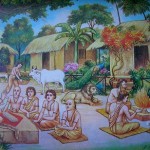Traditional Education

Traditional education is practically a thing of the past, something that most of us have never even seen, what to speak of experienced. We are generally ignorant of what it is. The modern academia speaks about it in negative connotations. Traditional education is presented as outdated, backward, irrelevant, and even prejudiced. In the most polite of cases, it is considered to be primitive civilizations’ early attempts at education, which eventually led to our “glorious” academia of today—which supposedly reaches heights that were never achieved before. Most of us who were molded by today’s modern education were exposed to such propaganda, to some extent. Our modern conditioning influences us and makes us (even devotees) apprehensive of traditional education. Such are the effects of atheism.
In the university where I took up postgraduate studies in education, just a few years ago, the traditional gurukula system of India and the traditional pondok pesantren system of Indonesia were classified as “non-formal education.” In the Indonesian language, the specific term for describing these is pendidikan luar sekolah, literally, “education outside of school.” Ironically, what today is classified as “education outside of school” (non-formal education) was traditionally the only education taught in the school settings such as gurukula or pondok pesantren, and was considered formal education. All other education was “outside of school,” the equivalent of what is today called “vocational training” or “apprenticeship” (non- formal education). The educational culture has basically done a full somersault, such that non-formal education is now considered formal, and formal education considered non-formal. Today’s science and technology promote studies and research that deal primarily with the advancement of vocational trades (computer and other machine- oriented technology) and give less importance to the academic fields of theology, philosophy, and humanities. How has this come about, and what kind of results can we expect from it? A substantial portion of the answer lies in the following statement:
“The effects of the Sophists on education necessarily make one wonder whether it is wise to entrust education to the technicians rather than the philosophers.”
(Pratt, David—Curriculum: Design and Development)
we have indeed allowed educational policies to be influenced and dictated by the interests of political leaders, powerful industrial magnets, technocrats, and scientists—all of whom tend to lack wisdom and push a different ethos. Due to their materialistic training, such “leaders” are ill-motivated, greedy, short-sighted, and devoid of philosophical or spiritual insight.:
Today’s so-called education is actually promoting avidyä (nescience), because the core eternal principles of knowledge are missing. If an educational system or pursuit is to elevate any human being, it must be governed by those essential principles. Modern educators’ very definition of knowledge and education is flawed, as well as their aim, because they ignore krsna. Put simply, when education is used for promoting materialistic pursuits, the result must be shortcomings and failures, because neither the nature nor purpose of education is appreciated. In the name of such so-called education, teachers and students are simply playing a costly game. As explained by Srila Prabhupäda:
“Unless in the human society the Varnasrama system is introduced, no scheme or social order, health order or any order, political order,
will be successful.” (Conversation—Våndävana, 18 October 1977)
Where and how we live also shape our education. Sociology and education go hand in hand. Whatever a society values will dictate its curricula and education and consequently will shape the future of that society. Hence it is crucially important to understand the intimate connection between education and society. And that connection is relevant not only in the formative years, but all throughout one’s life. As indicated by Çréla Prabhupäda (above), unless we understand the essence of an ideal society (Varnasrama), any attempt to develop effective and meaningful educational systems will fail. Moreover, one must know that, if disconnected from krsna, Varnasrama and its educational systems will yield only very temporary, material success. Therefore, to reveal the goal of life and bring about lasting happiness, education should be based on daiva-Varnasrama. The beneficiary of such an education will be properly situated both materiality and spiritually.
Vedäntic sociology, or daiva-Varnasrama-dharma, is the most ideal, most scientific, and most fulfilling educational institution. It will make one vastly learned, organized, productive, skilled, cultured, wise, and, ultimately, self-realized.
Persons interested in this subject matter are invited to read the books of His Divine Grace A. C. Bhaktivedanta Swami Prabhupäda, in particular the Bhagavad-gétä and Srimad-Bhägavatam. One may also correspond with this humble servant of His Divine Grace or visit our website dedicated to Varnasrama-dharma at:
From Traditonal Education Book:
http://www.sahyadriksetra.com/bookstore.html
www.iskconvarnasrama.com
Hare Krsna.
Bhakti Räghava Swami